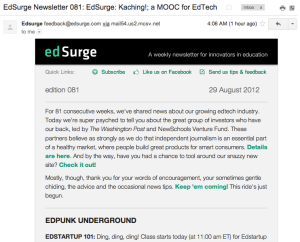When I decided to begin covering the intersection of technology, entrepreneurship and education more seriously, my first goal was to seek out the best resources, or community watering holes, for edtech information. Anyone who has embarked on a similar quest will tell you that, while sites like Inside Higher Ed do a great job of carrying the torch, traditionally the market for edtech news and info has been seriously fragmented, with (thin) coverage scattered across a number of small, niche sites.
However, beginning last year, veterans of the space like Jon Bischke increasingly began pointing me to a new site called EdSurge, which was reportedly on a mission to glue the fragmented market back together.
Founded in February 2011 by long-time journalists and veterans of education technology, EdSurge set out to create an online hub through which entrepreneurs could better connect with the educators using their products and vice versa. By way of its popular weekly eNewsletter and website, the startup provides insiders and outsiders with an alternative to Consumer Reports or Yelp — a source of unbiased information on the people, products and companies working to bring some innovation (and funk) to the crossroads of education and technology.
The startup grew to a team of seven thanks to early financial support from Bill Gates (through grants from The Bill and Melinda Gates Foundation) and others. But, now more than a year removed from launch, EdSurge is looking to expand the breadth of its coverage and further develop independent reviews of edtech startups and products. To do so, the startup is today announcing that it has secured $400K in seed funding from institutional and angel investors, including the Washington Post Company, NewSchools Venture Fund, Allen & Co. execs Nancy Peretsman and Gillian Munson, O’Reilly Media exec Dale Dougherty, and Judy Estrin.
But why should you care about some niche edtech resource? For a long time, the infrastructure and policy of the educational system (and those institutions overseeing it) has been so tangled and resistant to change that many investors have balked at sinking capital into edtech startups. Just ask Marc Andreessen.
However, that psychology has begun to flip — along with classrooms. Over the last 18 months in particular, venture capital has begun flowing into education, and the edtech ecosystem is now emerging at a breakneck pace, with successful consumer and gaming-focused entrepreneurs increasingly making the jump to education. The emergence of edtech-focused VC funds like NewSchools is another indication of the growing interest.
On more than one occasion, I’ve been known to mutter about the lack of entrepreneurial focus on problems or areas where technology can actually affect real change — not just give people a better way to share photos or find a dog walker. (Peter Thiel and Max Levchin spoke about this issue at Disrupt last year.)
 Today, the cost of education — something that most people spend the first quarter of their life working towards — is ridiculous and unsustainable. Student loan dept in the U.S. hit the trillion-dollar threshold this year, pushing past most other forms of consumer debt (namely credit cards and car loans). The educational system is a mess, and now more than ever the industry is in need of talent and entrepreneurial energy to help solve these far-reaching problems.
Today, the cost of education — something that most people spend the first quarter of their life working towards — is ridiculous and unsustainable. Student loan dept in the U.S. hit the trillion-dollar threshold this year, pushing past most other forms of consumer debt (namely credit cards and car loans). The educational system is a mess, and now more than ever the industry is in need of talent and entrepreneurial energy to help solve these far-reaching problems.
Whenever entrepreneurs interested in learning more about the edtech landscape (and the startups that comprise it), I often recommend checking out EdSurge. (And that’s not just because the startup has been called the “TechCrunch for Education,” though there are a obviously a number of parallels in terms of founding mission statements.)
That’s because, through its website, newsletters, events and by sharing best practices for blended learning and beyond, EdSurge is trying to bring timely, independent info to educators, entrepreneurs, investors and policy makers to help them make more informed decisions. And create products and tools that teachers and students actually use and will actually help optimize the learning process.
As an edtech resource, EdSurge has also become attractive to investors and entrepreneurs because of its founding team. For example, its CEO, Elizabeth Corcoran, is a long time technology journalist and previously the executive tech editor at Forbes (and a staff writer for the Washington Post). The company’s president, Nick Punt, is the former product VP at Gates Foundation-backed Inigral, a private social network for higher ed. Based on these connections (and the site’s journalistic/repertorial coverage), the participation of WaPo and the Gates Foundation in the startup’s seed funding gain some context.
“We believe that great journalism has a big role to play in spurring companies to build the best products,” says Washington Post Chairman Don Graham, and one of the main reasons why the company decided to support Edsurge, he said. Entrepreneurs want a place where they can share their experience building educational tools and find up-to-date information about a landscape that’s evolving quickly.
Plus, teachers have become an increasingly vocal and connected group. Many don’t realize that teachers are active (some might even say aggressive) early adopters and social media users. But as teacher and blogger Melissa Kaplan points out, Google search results for edtech questions often just end up serving content that can be overly academic or bland market analysis. Adding a bit of blogging to its content production means that EdSurge is readable and actually produced for humans, by humans.
What’s more, as more and more startups and products pop up (it now seems like there’s a new one every week), schools and educators want a better way to sift through the BS and find, say, a review that can help them determine whether it’s something they should consider adopting for their classroom.
As it moves forward, this will become critical for EdSurge. Being a cheerleader only goes so far (and so does linking out to other sources), so supplementing content with stories from the other side to help entrepreneurs and educators better separate the wheat from the chafe, the goldrushers from the real innovators, is key. And having veteran journalists on board helps inspire confidence among its tens of thousands of readers that this will continue.
For more, find EdSurge at home here.

